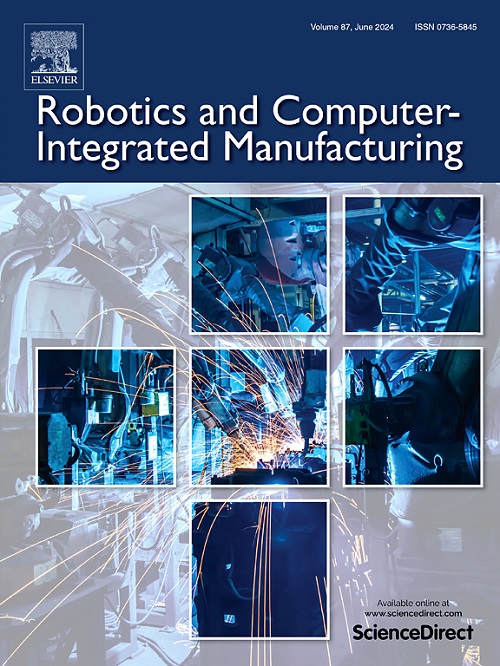基于混合正则化支持向量数据描述的高速加工异常检测
IF 9.1
1区 计算机科学
Q1 COMPUTER SCIENCE, INTERDISCIPLINARY APPLICATIONS
引用次数: 0
摘要
高速加工过程监控是保证产品质量和提高加工效率的重要手段。然而,从实际加工过程中获得的数据是完全未标记和严重不平衡的,这可能严重不足以支持基于深度学习的异常检测。此外,采集到的信号不可避免地会受到环境噪声和不确定因素的污染。如何根据数据的分布特征去除这些干扰仍然是一个具有挑战性的问题。为了解决这些限制,提出了一种新的可解释机器学习方法,称为混合正则化支持向量数据描述(H-SVDD),用于HSM过程中的无监督异常检测。本文首先构建自适应局部核密度估计来消除离群点干扰,并分配可解释的权重来优化SVDD以提高检测精度。随后,通过引入低范数惩罚机制,创新设计了广义概率密度正则化SVDD,提高了对复杂加工过程的描述能力。最后,提出了一种基于贝叶斯优化的超参数调优策略,以提高系统的泛化性和稳定性。通过对数控机床的数据采集,验证了所提方法的优越性。实验结果表明,所提出的H-SVDD方法比现有的SVDD方法具有更高的检测精度,并且消除了噪声干扰引起的虚警。本研究为独立感知高速切削机床的健康状况提供了有益的解决方案。本文章由计算机程序翻译,如有差异,请以英文原文为准。
Anomaly detection for high-speed machining using hybrid regularized support vector data description
Process monitoring in high-speed machining (HSM) is essential to guarantee product quality and improve manufacturing efficiency. Nevertheless, the data acquired from practical machining processes are completely unlabeled and severely unbalanced, which may be seriously insufficient to support deep learning-based anomaly detection. Furthermore, the collected signals are inevitably contaminated by environmental noises and uncertain factors. How to remove these disturbances according to data distribution characteristics remains a challenging issue. To tackle these limitations, a novel interpretable machine learning approach, called hybrid regularized support vector data description (H-SVDD), is proposed for unsupervised anomaly detection during HSM. In this work, an adaptive local kernel density estimate is first constructed to eliminate outlier interferences, and assigns interpretable weights to optimize the SVDD for improving detection accuracy. Subsequently, by introducing the lp-norm penalty mechanism, a generalized probability density regularized SVDD is innovatively designed to enhance the descriptive capability for complex machining processes. Finally, a hyperparameter tuning strategy based on Bayesian optimization is developed to improve generalizability and stability. The data collected from CNC machines are used to verify the superiority of the proposed method. Experimental results show that the proposed H-SVDD has higher detection accuracy than current SVDD methods and eliminates false alarms caused by noise interferences. This work may provide a useful solution for independently perceiving the health conditions of HSM.
求助全文
通过发布文献求助,成功后即可免费获取论文全文。
去求助
来源期刊
CiteScore
24.10
自引率
13.50%
发文量
160
审稿时长
50 days
期刊介绍:
The journal, Robotics and Computer-Integrated Manufacturing, focuses on sharing research applications that contribute to the development of new or enhanced robotics, manufacturing technologies, and innovative manufacturing strategies that are relevant to industry. Papers that combine theory and experimental validation are preferred, while review papers on current robotics and manufacturing issues are also considered. However, papers on traditional machining processes, modeling and simulation, supply chain management, and resource optimization are generally not within the scope of the journal, as there are more appropriate journals for these topics. Similarly, papers that are overly theoretical or mathematical will be directed to other suitable journals. The journal welcomes original papers in areas such as industrial robotics, human-robot collaboration in manufacturing, cloud-based manufacturing, cyber-physical production systems, big data analytics in manufacturing, smart mechatronics, machine learning, adaptive and sustainable manufacturing, and other fields involving unique manufacturing technologies.

 求助内容:
求助内容: 应助结果提醒方式:
应助结果提醒方式:


